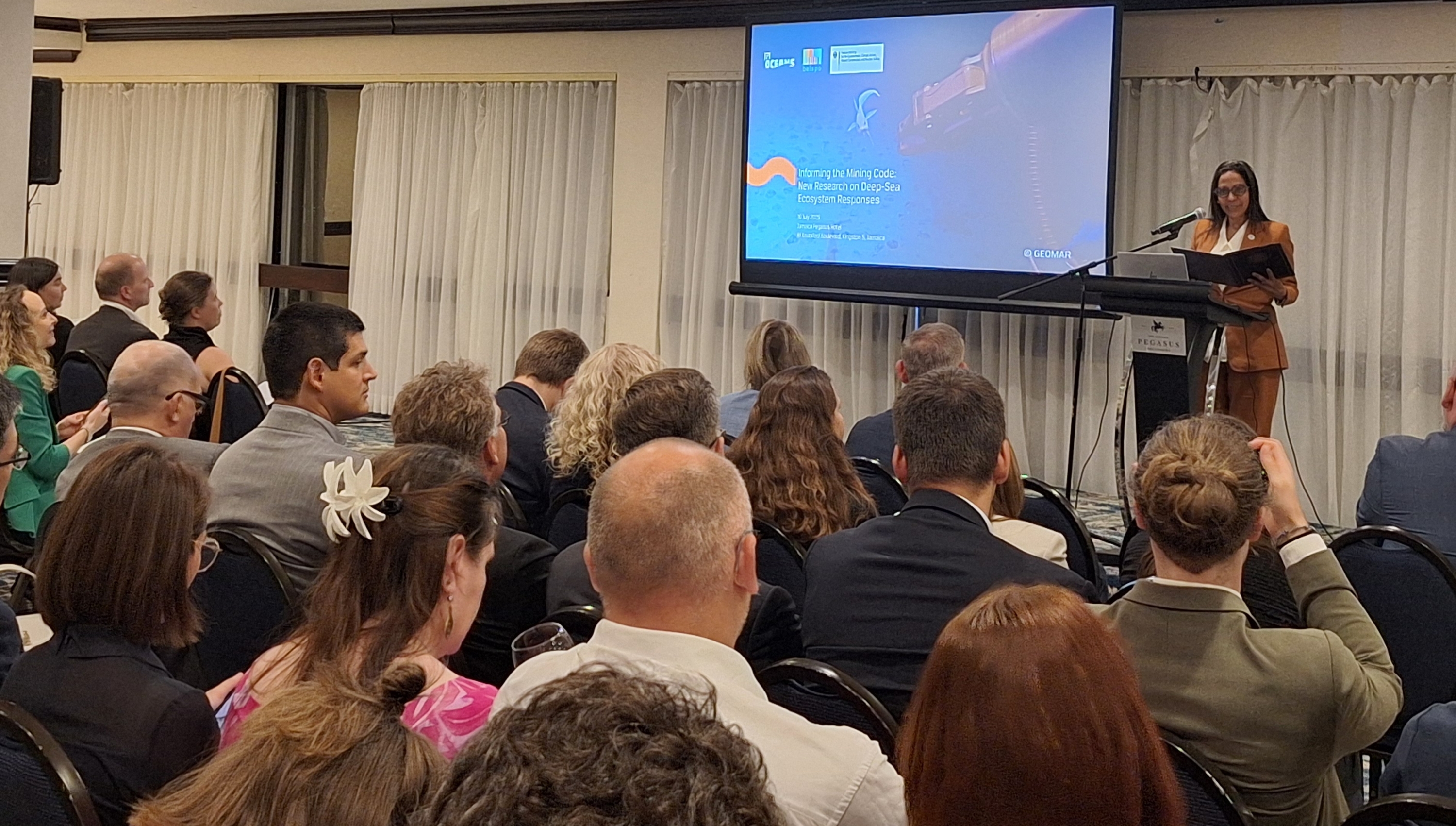Leading marine scientists presented a decade of research on deep-sea mining's environmental impacts at a high-profile side event during the International Seabed Authority (ISA) Council meeting in Kingston, Jamaica, on 16 July 2025. The event, "Informing the Mining Code: New Research on Deep-Sea Ecosystem Responses," also marked the launch of MiningImpact3 (project website), the latest project in the series funded under the framework of JPI Oceans.
The evening at the Jamaica Pegasus Hotel drew strong diplomatic interest, with an audience of over 120 participants consisting of delegates, ISA representatives, and observers. Opening and closing remarks from the Belgian Ambassador and German Ambassador to Jamaica, respectively, highlighted the importance of science in informing international negotiations. ISA Secretary-General Leticia Carvalho emphasized the critical timing of these research contributions.
"This event comes at a pivotal moment for the International Seabed Authority, as Member States are engaged in finalizing the legal and technical framework that will guide all future activities in the Area," the Secretary-General stated. "The deep sea needs rules and clear, science-based standards. And that science must be robust, independent, and widely shared."
The Secretary-General commended the project: “As a scientist myself, this project speaks to my heart. It reflects what I believe must be at the center of our work: a shared commitment to cooperation, excellence, and stewardship.”

Dr. Matthias Haeckel from GEOMAR presented compelling findings from independent monitoring of nodule collection trials in the Clarion-Clipperton Zone in the central Pacific Ocean. His research team documented that sediment plumes remain mainly within 10 meters of the seafloor but can travel several kilometres with bottom currents—critical information for setting environmental standards.
"We observed removal of 4-8 centimetres of surface sediment during collection trials, with redeposition of 2-3 centimetres in the mined and surrounding areas," Dr. Haeckel explained.
These findings, published in over 120 peer-reviewed papers since 2015, have directly informed ISA discussions on environmental thresholds and monitoring requirements. The presentation also introduced MiningImpact3's ambitious plans to revisit trial sites after five years, providing crucial data on longer-term ecosystem recovery.
Dr. Sabine Gollner from the Royal Netherlands Institute for Sea Research presented the planned activities on seafloor massive sulphides, addressing a significant knowledge gap as discussions expand beyond polymetallic nodules.
"While active vents clearly warrant protection, inactive vents—the likely mining targets—host potentially unique communities we are only beginning to understand," Dr. Gollner noted.
Professor Ellen Pape from Ghent University brought a unique perspective by presenting outcomes from extensive stakeholder dialogues in Belgium. These round-table meetings, involving industry, NGOs, authorities, and scientists, identified 80 research questions addressing ten major environmental concerns.
"This process ensures our research addresses society's key questions, not just academic interests," Professor Pape explained. She revealed that MiningImpact 3 would incorporate innovative approaches including artist collaborations and enhanced stakeholder engagement throughout the project's four-year duration.
German Ambassador Mr Jan Hendrik van Thiel concluded from the science presentations that “substantial knowledge gaps exist.” By calling out the UN Ocean Decade slogan: "The science we need for the ocean we want", he then declared MiningImpact 3 “an essential building block of the commitment to scientific knowledge gain.”
Belgian Ambassador Ms Ellen De Geest outlined how a new International Engagement Hub linked to the MiningImpact3 project is planned to enhance global participation in the funded deep-sea research. "With MiningImpact3, we are not just continuing research, we are building a platform for international collaboration," she explained.
The hub will include an advisory board with representatives from civil society, industry, and scientists from beyond Europe, ensuring diverse perspectives inform both research priorities and policy recommendations. The first meeting is scheduled for September 2025 in Ghent, Belgium.